4 pronouns
- 格式:ppt
- 大小:774.00 KB
- 文档页数:18
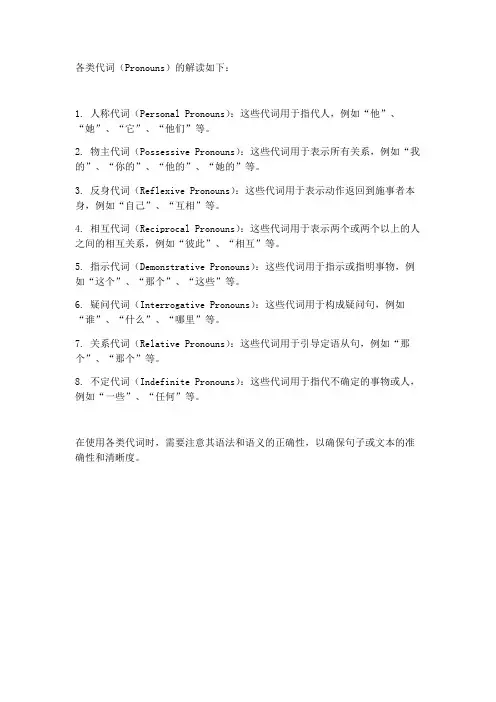
各类代词(Pronouns)的解读如下:
1. 人称代词(Personal Pronouns):这些代词用于指代人,例如“他”、“她”、“它”、“他们”等。
2. 物主代词(Possessive Pronouns):这些代词用于表示所有关系,例如“我的”、“你的”、“他的”、“她的”等。
3. 反身代词(Reflexive Pronouns):这些代词用于表示动作返回到施事者本身,例如“自己”、“互相”等。
4. 相互代词(Reciprocal Pronouns):这些代词用于表示两个或两个以上的人之间的相互关系,例如“彼此”、“相互”等。
5. 指示代词(Demonstrative Pronouns):这些代词用于指示或指明事物,例如“这个”、“那个”、“这些”等。
6. 疑问代词(Interrogative Pronouns):这些代词用于构成疑问句,例如“谁”、“什么”、“哪里”等。
7. 关系代词(Relative Pronouns):这些代词用于引导定语从句,例如“那个”、“那个”等。
8. 不定代词(Indefinite Pronouns):这些代词用于指代不确定的事物或人,例如“一些”、“任何”等。
在使用各类代词时,需要注意其语法和语义的正确性,以确保句子或文本的准确性和清晰度。
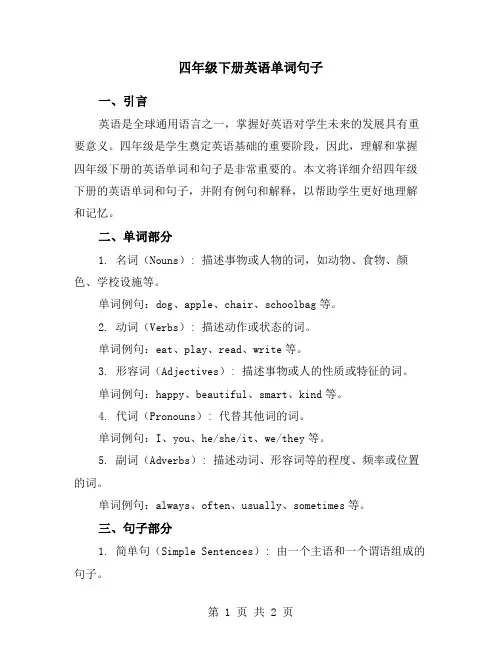
四年级下册英语单词句子一、引言英语是全球通用语言之一,掌握好英语对学生未来的发展具有重要意义。
四年级是学生奠定英语基础的重要阶段,因此,理解和掌握四年级下册的英语单词和句子是非常重要的。
本文将详细介绍四年级下册的英语单词和句子,并附有例句和解释,以帮助学生更好地理解和记忆。
二、单词部分1. 名词(Nouns): 描述事物或人物的词,如动物、食物、颜色、学校设施等。
单词例句:dog、apple、chair、schoolbag等。
2. 动词(Verbs): 描述动作或状态的词。
单词例句:eat、play、read、write等。
3. 形容词(Adjectives): 描述事物或人的性质或特征的词。
单词例句:happy、beautiful、smart、kind等。
4. 代词(Pronouns): 代替其他词的词。
单词例句:I、you、he/she/it、we/they等。
5. 副词(Adverbs): 描述动词、形容词等的程度、频率或位置的词。
单词例句:always、often、usually、sometimes等。
三、句子部分1. 简单句(Simple Sentences): 由一个主语和一个谓语组成的句子。
例句:The dog eats breakfast every day.(主语+及物动词)2. 并列句(Complex Sentences): 由两个或多个简单句组成的句子,用并列连词(如and、but等)连接。
例句:I like dogs and I usually play with them in the park.(两个简单句)3. 从句(Subordinate Clauses): 句子的一部分包含另一个句子,这个被包含的句子叫做从句。
通常由从属连词(如what、where、when等)引导。
例句:What I like most about dogs is their loyalty and companionship.(主句+从句)四、单词和句子的应用为了让学生更好地理解和记忆这些单词和句子,教师可以设计一些教学活动,如角色扮演、对话编写、故事编写等,让学生在真实的语境中使用这些单词和句子。
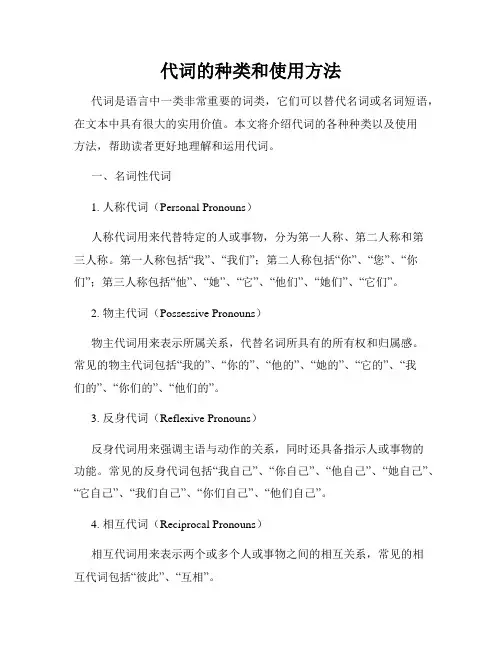
代词的种类和使用方法代词是语言中一类非常重要的词类,它们可以替代名词或名词短语,在文本中具有很大的实用价值。
本文将介绍代词的各种种类以及使用方法,帮助读者更好地理解和运用代词。
一、名词性代词1. 人称代词(Personal Pronouns)人称代词用来代替特定的人或事物,分为第一人称、第二人称和第三人称。
第一人称包括“我”、“我们”;第二人称包括“你”、“您”、“你们”;第三人称包括“他”、“她”、“它”、“他们”、“她们”、“它们”。
2. 物主代词(Possessive Pronouns)物主代词用来表示所属关系,代替名词所具有的所有权和归属感。
常见的物主代词包括“我的”、“你的”、“他的”、“她的”、“它的”、“我们的”、“你们的”、“他们的”。
3. 反身代词(Reflexive Pronouns)反身代词用来强调主语与动作的关系,同时还具备指示人或事物的功能。
常见的反身代词包括“我自己”、“你自己”、“他自己”、“她自己”、“它自己”、“我们自己”、“你们自己”、“他们自己”。
4. 相互代词(Reciprocal Pronouns)相互代词用来表示两个或多个人或事物之间的相互关系,常见的相互代词包括“彼此”、“互相”。
5. 指示代词(Demonstrative Pronouns)指示代词用来指示离说话人近或远的人或事物,常见的指示代词包括“这”、“那”、“这些”、“那些”。
6. 疑问代词(Interrogative Pronouns)疑问代词用来引导疑问句,提问特定人或事物的身份、数量或性质。
常见的疑问代词包括“谁”、“什么”、“哪个”、“哪些”、“几个”。
7. 关系代词(Relative Pronouns)关系代词用来引导定语从句,并且在从句中充当主语、宾语或定语。
常见的关系代词包括“谁”、“哪个”、“那个”、“那些”、“其”、“以及”。
二、用法示例1. 人称代词的使用- 第一人称单数:我喜欢阅读。
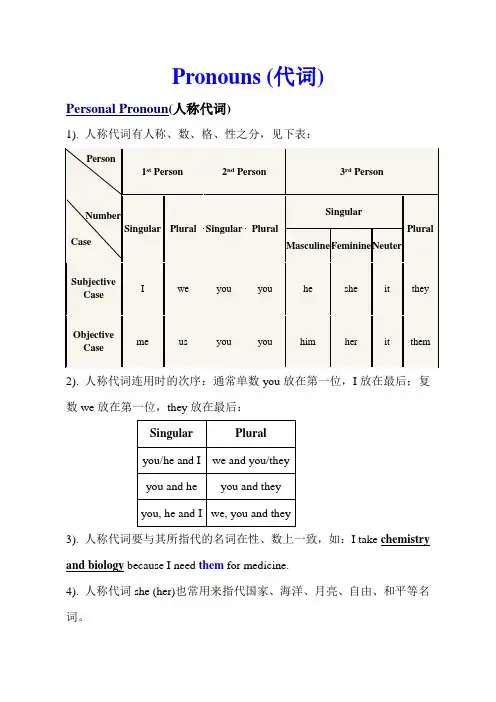
Pronouns (代词)Personal Pronoun(人称代词)1). 人称代词有人称、数、格、性之分,见下表:2). 人称代词连用时的次序:通常单数you放在第一位,I放在最后;复数we放在第一位,they放在最后:3). 人称代词要与其所指代的名词在性、数上一致,如:I take chemistry and biology because I need them for medicine.4). 人称代词she (her)也常用来指代国家、海洋、月亮、自由、和平等名词。
5).it可指事物、动物、未知的人;可表示天气、时间、距离等,也可作形式主语、形式宾语来代替不定式短语、动名词短语或从句,it还可用于构成强调句型,如:It's Sunday today.I found it necessary to go on with this experiment.It's Mary that we are talking about.Possessive Pronoun(物主代词)1). 英语中的物主代词有形容词型和名词型两种,见下表:2). 形容词型物主代词只能用作定语,而名词型物主代词可用作主语、宾语和表语,如:I can't find my pen. Can you lend me yours?3). 名词型物主代词可与of连用,构成双重所有格,如:She is a friend of mine.4).形容词型物主代词his, her, their等在人称、性、数上要和它们所指代的名词一致。
如果不能判断句中名词的属性,一般用his,如:Every girl is doing her best.Each teacher has his own teaching method.5). 集合名词作整体看待时用its(或his,her)指代,作个体看待时用their 取代,如:The Smiths could not agree on where to spend their vacation.The public expressed its concern about the flood.Reflexive Pronoun(反身代词)1).英语反身代词有:myself, yourself, himself, herself, itself, ourselves, yourselves, themselves。
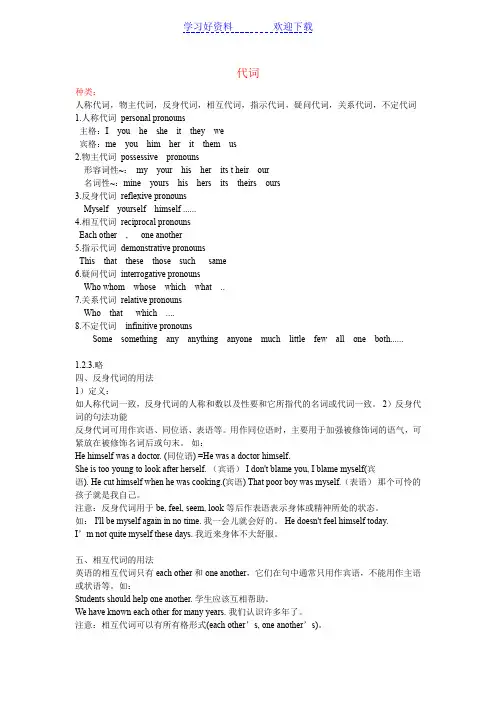
代词种类:人称代词,物主代词,反身代词,相互代词,指示代词,疑问代词,关系代词,不定代词1.人称代词personal pronouns主格:I you he she it they we宾格:me you him her it them us2.物主代词possessive pronouns形容词性~:my your his her its t heir our名词性~:mine yours his hers its theirs ours3.反身代词reflexive pronounsMyself yourself himself ......4.相互代词reciprocal pronounsEach other , one another5.指示代词demonstrative pronounsThis that these those such same6.疑问代词interrogative pronounsWho whom whose which what ..7.关系代词relative pronounsWho that which ....8.不定代词infinitive pronounsSome something any anything anyone much little few all one both......1.2.3.略四、反身代词的用法1)定义:如人称代词一致,反身代词的人称和数以及性要和它所指代的名词或代词一致。
2)反身代词的句法功能反身代词可用作宾语、同位语、表语等。
用作同位语时,主要用于加强被修饰词的语气,可紧放在被修饰名词后或句末。
如:He himself was a doctor. (同位语) =He was a doctor himself.She is too young to look after herself. (宾语) I don't blame you, I blame myself(宾语). He cut himself when he was cooking.(宾语) That poor boy was myself.(表语)那个可怜的孩子就是我自己。

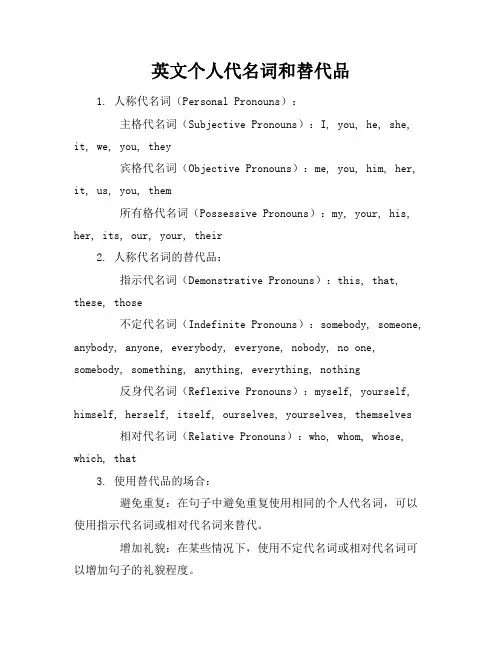
英文个人代名词和替代品1. 人称代名词(Personal Pronouns):主格代名词(Subjective Pronouns):I, you, he, she, it, we, you, they宾格代名词(Objective Pronouns):me, you, him, her, it, us, you, them所有格代名词(Possessive Pronouns):my, your, his, her, its, our, your, their2. 人称代名词的替代品:指示代名词(Demonstrative Pronouns):this, that, these, those不定代名词(Indefinite Pronouns):somebody, someone, anybody, anyone, everybody, everyone, nobody, no one, somebody, something, anything, everything, nothing反身代名词(Reflexive Pronouns):myself, yourself, himself, herself, itself, ourselves, yourselves, themselves 相对代名词(Relative Pronouns):who, whom, whose, which, that3. 使用替代品的场合:避免重复:在句子中避免重复使用相同的个人代名词,可以使用指示代名词或相对代名词来替代。
增加礼貌:在某些情况下,使用不定代名词或相对代名词可以增加句子的礼貌程度。
提高正式性:在正式的写作或演讲中,使用替代品可以使语言更加正式和规范。
4. 替代品的用法示例:指示代名词:This book is mine. (这本书是我的。
)不定代名词:Someone left their umbrella here. (有人把伞留在这里了。
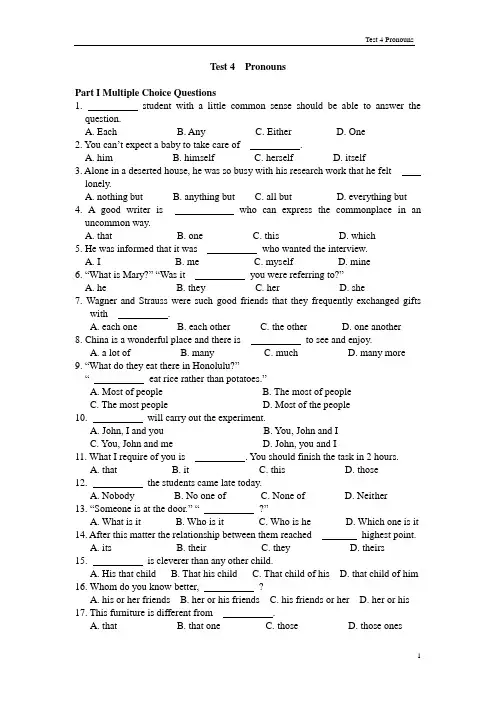
Test 4 PronounsPart I Multiple Choice Questions1. student with a little common sense should be able to answer the question.A. EachB. AnyC. EitherD. One2. You can’t expect a baby to take care of .A. himB. himselfC. herselfD. itself3. Alone in a deserted house, he was so busy with his research work that he felt lonely.A. nothing butB. anything butC. all butD. everything but4. A good writer is who can express the commonplace in an uncommon way.A. thatB. oneC. thisD. which5. He was informed that it was who wanted the interview.A. IB. meC. myselfD. mine6. “What is Mary?”“Was it you were referring to?”A. heB. theyC. herD. she7. Wagner and Strauss were such good friends that they frequently exchanged giftswith .A. each oneB. each otherC. the otherD. one another8. China is a wonderful place and there is to see and enjoy.A. a lot ofB. manyC. muchD. many more9. “What do they eat there in Honolulu?”“eat rice rather than potatoes.”A. Most of peopleB. The most of peopleC. The most peopleD. Most of the people10. will carry out the experiment.A. John, I and youB. You, John and IC. You, John and meD. John, you and I11. What I require of you is . You should finish the task in 2 hours.A. thatB. itC. thisD. those12. the students came late today.A. NobodyB. No one ofC. None ofD. Neither13. “Someone is at the door.”“?”A. What is itB. Who is itC. Who is heD. Which one is it14. After this matter the relationship between them reached highest point.A. itsB. theirC. theyD. theirs15. is cleverer than any other child.A. His that childB. That his childC. That child of hisD. that child of him16. Whom do you know better, ?A. his or her friendsB. her or his friendsC. his friends or herD. her or his17. This furniture is different from .A. thatB. that oneC. thoseD. those ones18.—Why don’t we take a little break?—Didn’t we just have________?A. itB. thatC. one D .this19.________ is a fact that English is being accepted as international language.A. ThereB. AsC. ThatD. It20.They were all very tired,but ________ of them would stop to take a rest.A.anyB.someC.noneD.neither21.—Is ________ here?—No.Bob and Tim have asked for leave.A.anybodyB.everybodyC.somebodyD.nobody22.If you want to change for a double room,you’ll have to pay ________ $15.A.anotherB.otherC.moreD.each23.________ writer is better known in China,Charles Dickens or Mark Twain?A.WhichB.WhatC.EitherD.Whether24.Nobody but ________ and ________ went to see the film last night.A.he; TomB.Tom; heC.she; JaneD.Jane; her25.The writer goes to the library every ________ days and he’ll finish the novel within ________ days.A.a few; a fewB.few; fewC.few; a fewD.a few; few26.Please come in and make ________ at home,boys!A.youB.yourselfC.yourselvesD.yours27.Won’t you let ________ help you?A.I and my friendB.my friend and I 、C.my friend and meD.my friend and I to28.Teacher had told him again and again not to read such books,but ________ didn’t help.A.heB.theyC.sheD.it29.—Shall I talk to Miss Jane in English or Chinese?—Do as you please.She knows ________.A.anyB.neitherC.allD.both30.—Which do you prefer,classic music or pop music?— ________.I prefer light music.A.NoneB.EitherC.NeitherD.Both31.Put these stamps in the cupboard by ________.Do not mix them with other stamps.A.ourselvesB.itselfC.oneselfD.themselves32.He is one of these men who,I am sure,always do ________ best even in the worst condition.A.hisB.yourC.theirD.one’s33.Kate and her sister went on holiday with a cousin of ________.A.theirB.theirsC.herD.hers34.I hate ________ when people talk with their mouths full.A.itB.thatC.theseD.them35.—We weren’t the only students on the sports ground that day.—There were ________,you mean.A.another onesB.some othersC.some other onesD.the other ones36.Few pleasures can equal ________ of a cool drink on a hot day.A.someB.anyC.thatD.those37.—Did a letter come for me?—Yes,________ came for you this morning.A.thatB.itC.oneD.the letter38.The climate of Shanghai is as good as ________ of Beijing.A.thisB.thatC.itD.those39.The students in our class work much harder at English than ________ in their class.A.thoseB.theseC.thatD.this40.The TV sets made in Shanghai are much better than ________ made in Beijing.A.thatB.thoseC.onesD.they41.What I want to tell you is ________:the meeting is put off till Friday.A.thisB.itC.thatD.its42.I hope there are enough glasses for each guest to have ________.A.itB.thoseC.themD.one43.________ friends Betty had made there were all invited to her birthday party.A.The fewB.Few ofC.FewD.A fewPart II Please point out which of the 4 choices marked A, B, C, and D has an error in it and write the letter in the bracket provided at the beginning.( ) 44. Some people make more money than (A) we teachers, but (B) few gain(C) as much satisfaction from (D) his work.( ) 45. It is (A) obvious that inaccurate (B) or indefinite words may make (C) that difficult for the listener to understand the message which (D) isbeing transmitted to him.( ) 46.The (A) managing director refused (B) to accept (C) either of the four proposals (D) made by the contractors.( ) 47. These televisions are (A) quite popular (B) in Europe, but (C) those ones(D) are not.( ) 48. Let me give you two of the (A) consequences (B) of which I would guess that one will shock you while (C) another may perhaps surpriseyou more (D) favorably.( ) 49. In the early morning, the first thing (A) that (B) both my brother and (C) did (D) was to go out to see the pony.( ) 50. I don’t take (A)John’s pen because (B) I don’t like (C) that (D) his of pen.Answer SheetName: No. Class:1.2. 3.4.5.6.7.8.9.10.Test 4 Pronouns11.12.13. 14.15.16.17.18.19.20.21.22.23.24.25.26.27.28.29. 30.31.32.33.34.35.36.37.38.39.40.41.42.43.44.45.46.47.48.49.50.。
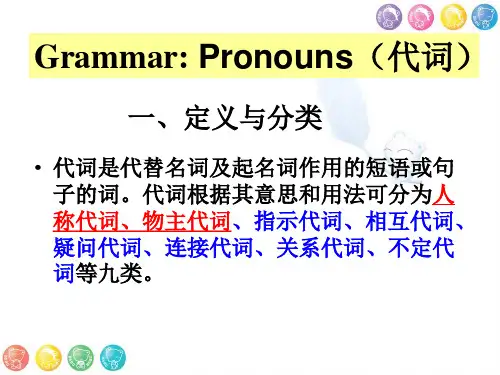
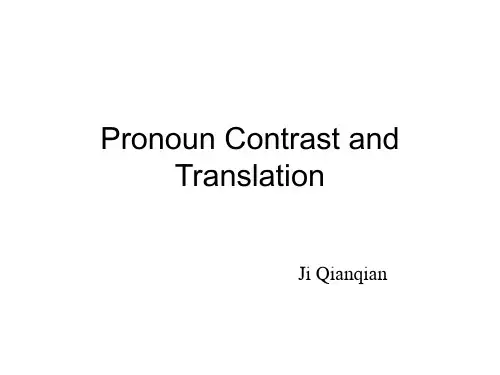
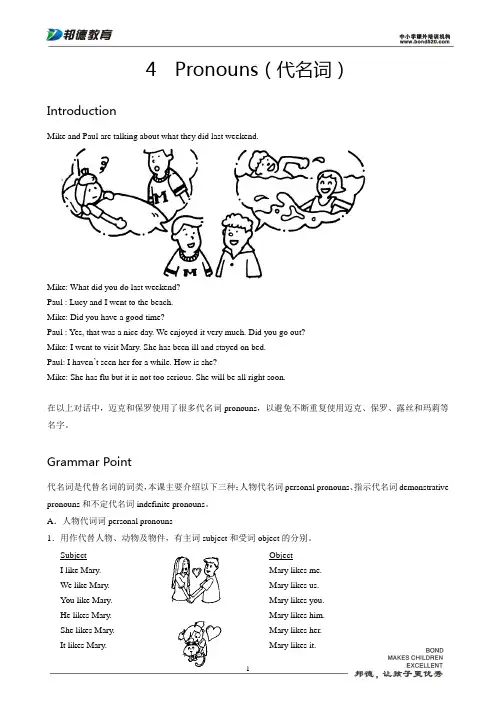
IntroductionMike and Paul are talking about what they did last weekend.Mike: What did you do last weekend?Paul : Lucy and I went to the beach.Mike: Did you have a good time?Paul : Yes, that was a nice day. We enjoyed it very much. Did you go out?Mike: I went to visit Mary. She has been ill and stayed on bed.Paul: I haven’t seen her for a while. How is she?Mike: She has flu but it is not too serious. She will be all right soon.在以上对话中,迈克和保罗使用了很多代名词pronouns,以避免不断重复使用迈克、保罗、露丝和玛莉等名字。
Grammar Point代名词是代替名词的词类,本课主要介绍以下三种:人物代名词personal pronouns、指示代名词demonstrative pronouns和不定代名词indefinite pronouns。
A.人物代词词personal pronouns1.用作代替人物、动物及物件,有主词subject和受词object的分别。
Subject ObjectI like Mary. Mary likes me.We like Mary. Mary likes us.You like Mary. Mary likes you.He likes Mary. Mary likes him.She likes Mary. Mary likes her.They like Mary. Mary likes them2.当‘I’和其他personal pronouns一同使用时,‘I’会放在较后的位置。
Lecture 4 pronounsPronouns are a varied closed-class words with notional functions. English has a developed pronoun system, comprising personal pronoun, possessive pronoun, reflxive pronoun (反身代词), reciprocal pronoun (相互代词), demonstrative pronoun, interrogative pronoun, relative pronoun, conjunctive pronoun and indefinite pronoun.4.1 personal pronounsPersonal pronouns include subject case (a) and object case (b):I you he she it we you they (a)me you him her it us you them (b)We all like it very mch. / He gave us some books.* We usually use object case as predicative, e.g.,Who is knocking at the door? --- It’s me. / If I were her, I would go there.* There are some notes about personal pronouns:1) I love you better than he. (he loves you.) (我比他爱你。
)I love you better than him. (I love him.) (我爱你胜过爱他。
)2) In the coordinate subjects, “I” is put at the end of the subject.Y ou, he and I will go shopping tomorrow.3) “she” is used to replace a country, a ship, the moon, etc.I think Englan will do what she promised to do.The “Elizabeth” is due in tomorrow, isn’t she?The moon is big and round. She is smiling in the sky.4) the use of “it”(1) “it” refers to a thing, e.g.,It is a harvester. (收割机combine)(2) “it” refers to a person, e.g.,Look at the baby in the picture. It is my sister.(3) “it” refers to weather, e.g.,It is snowy today.(4) “it” refers to time or season, e.g.,It is ten o’clock. / It is late autumn.(5) “it” refers to distance, e.g.,It is two miles away from here to the hopital.(6) “it” is used as formal subject and formal object, e.g.,It is difficult to learn English well. / I find it difficult to learn English well.(7) “it” is used in the emphatic structure, e.g.,It is in the classroom that we are learning grammar.(8) “it” is used to replace the whole sentence that was mentioned, e.g.,Y ou have saved my life; I’ll never forget it.4.2 possessive pronounsNominal possessive pronouns can perform most of the syntactic functions of a noun phrase. They can act as subject, object and predicative.1) subjectOur room is on the first floor and theirs is on the second.2) objectY our pen isn’t here. If you like, you may use mine.3) predicativeThis umbrella is yours and that one is hers.4.3 reflexive pronouns (反身代词)Reflexive pronouns can be used as object, predicative and appositive.I can’t express myself in English.She is too young to look after herself.I am not quite myself these days.The poor boy was myself.I myself finished it.In emphatic use, reflexives often follow a noun phrase or another pronoun as its appositive to reinforce its meaning. When the reinforced item is the subject of a sentence, the reflexive pronoun may have positional mobility. It may take medial or end position, and even initial position, that is, the position before the subject so as to lend special emphasis. If , on the other hand, the reinforced item is not the subject of the sentence, the reflexive pronoun must directly follow the item it emphasizes. Compare:The manager himself will interview Mary. (经理自己将面试玛丽。
pronouns的用法代词(Pronouns)是一种用来代替名词或名词短语的词语。
它们可以在句子中充当主语、宾语、定语或表语。
代词通常用于避免重复使用同一个名词,或者为了强调句子中的某个特定元素。
以下是一些常见的代词的用法:1. 主格代词(Subject Pronouns)用于代替名词作为主语。
它们在句子中通常出现在动词之前。
例如,“I am a student.”(我是一名学生。
)2. 人称代词(Personal Pronouns)是指为避免重复,而用来代替前面所提到过的表示人、动物、事物的词。
例如,“You are my friend.”(你是我的朋友。
)3. 代词作为宾语在句中作动词或介词的宾语。
例如,“Please tell me where she has gone.”(请告诉我她去哪里了。
)(me作动词宾语)“I heard him coming with them.”(我听说他和他们一起来。
(him作宾语,them作介词宾语))4. 代词作主语时,其后的谓语动词要和主语保持一致。
例如,“Myteac her is very kind.”(我的老师很和蔼。
)“They were complaining about her when she was passing the door.”(当她从门口走过时,他们正在抱怨她。
)5. 在一般现在时中,第三人称he/she/it作主语时,实义动词作谓语要在词尾加-s。
例如,“He who laughs at last laughs best.”(笑到最后的人才笑得最开心。
)以上内容仅供参考,建议查阅英语语法书籍或咨询英语教师,获取更准确的信息。
Pronouns俚语1. 介绍Pronouns俚语是一种以人称代词为基础的俚语形式,它在口语交流中非常常见。
人称代词(pronouns)是用来代替名词的词语,如he、she、it等。
在俚语中,人称代词经常被重新解释或扭曲,使其具有不同的含义和用法。
这些俚语常常表达出特定文化、群体或社会阶层的思维方式和价值观。
本文将深入探讨Pronouns俚语的起源、使用方式以及其对社会文化的影响。
2. 起源Pronouns俚语的起源可以追溯到英语发展的早期。
随着时间的推移,人们开始将人称代词与特定的含义联系在一起。
在口语交流中,Pronouns俚语逐渐兴起,成为了一种表达个人身份、群体认同和情感的方式。
3. 使用方式Pronouns俚语的使用方式多种多样,下面介绍几种常见的类型。
3.1 人称代词的改写这是最常见的Pronouns俚语使用方式之一。
人们通过改写人称代词的发音或拼写,创造出新的含义和用法。
例如,“he”在俚语中可以被改写成”heer”,意为”他很酷”。
这种改写带有一定的幽默和戏谑的成分,用来凸显某人的特点或进行调侃。
3.2 人称代词的替换除了改写人称代词,人们还可以使用其他词语来替代人称代词。
例如,“he”可以被替换成”lad”,意为”男孩”;“she”可以被替换成”gal”,意为”女孩”。
这种替换常常用来表示亲近、友好的态度,或者强调某人的特质和形象。
3.3 人称代词的借用Pronouns俚语还包括一些借用人称代词的短语和搭配。
这些短语和搭配在口语交流中非常常见,用来表达特定情感或强调某人的身份。
例如,“I’m all ears”意为”我洗耳恭听”,表示对对方的倾听和关注。
4. 社会文化影响Pronouns俚语作为一种特殊的语言形式,对社会文化产生了一定的影响。
4.1 俚语的流行由于Pronouns俚语具有幽默、夸张和戏谑的特点,它在流行文化中非常受欢迎。
俚语常常出现在歌曲、电影、网络和社交媒体中,带给人们娱乐和乐趣。
四级必背单词大全词汇对于英语学习者而言是非常重要的一部分,掌握足够的词汇量可以帮助我们更好地理解和运用英语。
下面是四级必背单词大全,希望对大家的英语学习有所帮助。
一、名词类(Nouns)1. apple - 苹果2. book - 书3. cat - 猫4. dog - 狗5. elephant - 象6. fish - 鱼7. girl - 女孩8. hat - 帽子9. ice cream - 冰淇淋10. job - 工作二、动词类(Verbs)1. ask - 询问2. bring - 带来3. call - 打电话4. dance - 跳舞5. eat - 吃6. find - 找到7. give - 给予8. have - 拥有9. invite - 邀请10. jump - 跳跃三、形容词类(Adjectives)1. beautiful - 美丽的2. cold - 冷的3. dark - 暗的4. easy - 容易的5. funny - 搞笑的6. happy - 开心的7. important - 重要的8. kind - 友好的9. loud - 大声的10. messy - 杂乱的四、副词类(Adverbs)1. always - 总是2. carefully - 小心地3. easily - 容易地4. fast - 快速地5. happily - 快乐地6. interestingly - 有趣地7. loudly - 大声地8. never - 从不9. quickly - 迅速地10. slowly - 慢慢地五、代词类(Pronouns)1. I - 我2. you - 你3. he - 他4. she - 她5. it - 它6. we - 我们7. they - 他们8. this - 这个9. that - 那个10. these - 这些总结:以上就是四级必背单词大全,包括名词、动词、形容词、副词和代词等各种词汇。
英语代词归纳大全1. 主格代词(Subjective Pronouns)I(我)You (你)He(他)She (她)It(它)We(我们)They (他们/她们/它们)2. 宾格代词(Objective Pronouns)Me(我)You (你)Him (他)Her (她)It(它)Us(我们)Them (他们/她们/它们)3. 形容词性物主代词(Adjective Possessive Pronouns)My(我的)Your (你的)His (他的)Her (她的)Its (它的)Our (我们的)Their (他们的/她们的/它们的)4. 名词性物主代词(Noun Possessive Pronouns)Mine (我的)Yours (你的)His (他的)Hers (她的)Its (它的)Ours (我们的)Theirs (他们的/她们的/它们的)5. 反身代词(Refle某ive Pronouns)Myself (我自己)Yourself (你自己)Himself (他自己)Herself (她自己)Itself (它自己)Ourselves (我们自己)Themselves (他们自己/她们自己/它们自己) 6. 强调代词(Emphatic Pronouns)Myself (我自己)Yourself (你自己)Himself (他自己)Herself (她自己)Itself (它自己)Ourselves (我们自己)Yourselves (你们自己)Themselves (他们自己/她们自己/它们自己) 7. 相互代词(Reciprocal Pronouns)Each other (彼此)One another (彼此)8. 不定代词(Indefinite Pronouns)Somebody (某人)Anybody (任何人)Nobody (没有人)Everybody (每个人)Someone (某人)Anyone (任何人)No one (没有人)Everyone (每个人)Something (某事)Anything (任何事)Nothing (没有事)Everything (每件事)Some (一些)Any (任意的)None (没有)All (所有的)9. 关系代词(Relative Pronouns)Who (谁)Whom (谁)Whose (谁的)Which (哪个)That (那个)Where (哪里)When (何时)Why (为什么)10. 疑问代词(Interrogative Pronouns)Who (谁)Whom (谁)Whose (谁的)Which (哪个)What (什么)以上是常见的英语代词,可以满足日常交流和写作的需要。